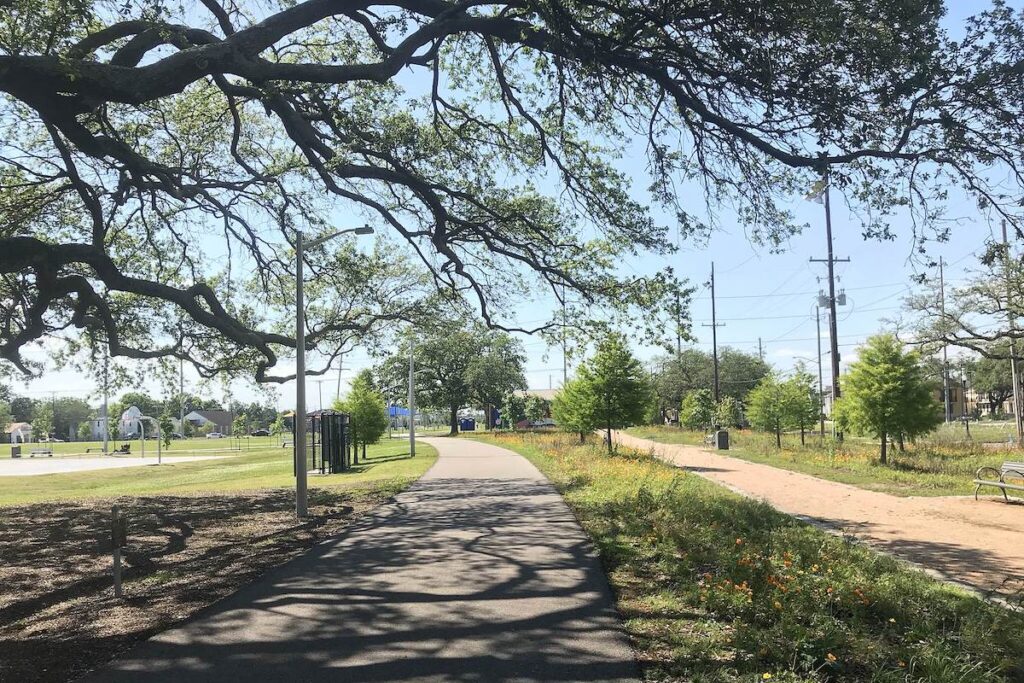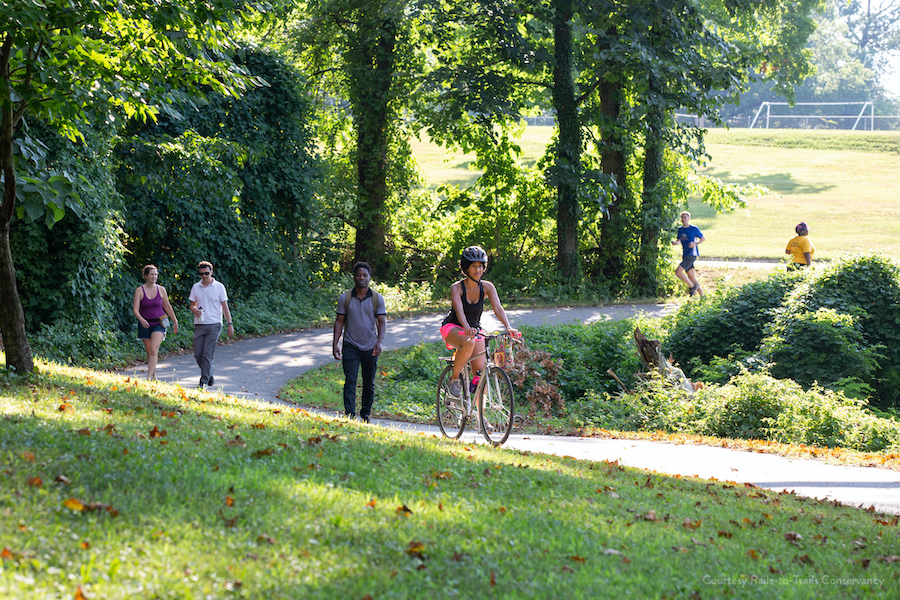Trail Networks and Housing Stability
Holmes Run Trail | Photo by Laura Stark
Trails provide substantial benefits for people and communities, but an important issue is whether these benefits impact property values and can contribute to gentrification. Rails-to-Trails Conservancy’s (RTC) original research examines the relationship between trails and property values and provides guidance from experts on how to maintain housing stability and equitable access to trails. The resources found here offer insights about the impact of trails on gentrification, alongside perspectives from experts in the fields of housing and community development about the impact of trail networks on housing markets and best practices to promote and preserve affordable housing.
Study: Neighborhood Change and Gentrification Near Three Urban Trails

In recent years, concerns have emerged through location-specific studies about the correlation between trails and gentrification, especially in high-profile urban trail markets with significant housing cost pressures. RTC convened a research team to further explore this correlation to better understand the relationship between trail development and housing stability in a broader range of neighborhoods and housing markets. The research looked at changes in gentrification indicators in the communities surrounding the three trails—the Metropolitan Branch Trail in Washington, D.C., the Shelby Farms Greenline in Memphis, Tennessee, and the Lafitte Greenway in New Orleans, Louisiana.
Literature Review: Strategies to Preserve and Build Affordable Housing Near Green Amenities and Urban Trails

What strategies and policies have or can be used by cities to build or preserve affordable housing near green amenities and urban trails? This brief, developed by Johns Hopkins 21st Century Cities Initiative, provides a review of the academic literature on strategies to preserve and build affordable housing with respect to green amenities and urban trails. The brief examines a variety of strategies including shared equity homeownership models, upzoning, rent control, community benefits agreements, community equity endowments, tax credits and affordable housing trust funds as strategies to preserve affordable housing near green infrastructure like trails.
Trail Networks and Housing Stability Webinar Series
RTC’s three-part ‘Trail Networks and Housing Stability’ webinar series, convened experts from the fields of housing and community development to discuss the impact of trail networks on housing markets and best practices to promote and preserve affordable housing. These conversations focused on understanding the research and the approaches that can be implemented proactively, in partnership and with intention, to promote housing stability and address gentrification concerns.
Panelists:
- Greg Lindsey, Professor, Ph.D., Humphrey School of Public Affairs, University of Minnesota
- Mac McComas, Senior Program Manager, 21st Century Cities Initiative, Johns Hopkins University
- Torsha Bhattacharya, Ph.D., RTC’s Director of Research
- Moderator: Ryan Chao, RTC’s President
Part 1: Exploring the Evidence Base
In recent years, concerns have emerged through location-specific studies about the correlation between trails and gentrification, especially in high-profile urban trail markets with significant housing cost pressures. To better understand the relationship between trail development and housing stability in a wide range of neighborhoods and housing markets, RTC partnered with researchers from the University of Minnesota and the Brookings Institution to study this issue further, and with Johns Hopkins University’s 21st Century Cities Initiative to conduct a thorough review of affordable housing best practices around trails and trail networks.
In this webinar, we will explore the research and evidence base surrounding the relationship between trails, property values and displacement, as well as best practices to promoting housing stability alongside trail development to create equitable and inclusive communities.
Panelists:
- Maria Gonzalez, Executive Director, HACE
- Samantha Meyer, Project Developer, Eden Housing
- Nick Mitchell-Bennett, Executive Director, come dream come build
- Moderator: Ryan Chao, President, Rails-to-Trails Conservancy
Part 2: Affordable Housing Development
Trails provide substantial benefits for people and communities, but an important issue is whether these benefits impact property values and can contribute to gentrification. RTC’s original research examines the relationship between trails and property values and provides guidance from experts on how to maintain housing stability and equitable access to trails.
Our ‘Trail Networks and Housing Stability’ webinar series will convene experts from the fields of housing and community development to discuss the impact of trail networks on housing markets and best practices to promote and preserve affordable housing. Throughout the series, the focus will be on understanding the research and the approaches that can be implemented proactively, in partnership and with intention, to promote housing stability and address gentrification concerns. Moderated by Ryan Chao, president of Rails-to-Trails Conservancy and previously the executive director of Satellite Housing, where he led the development of affordable housing communities throughout Northern California.
Panelists:
- Marc Caswell, Program Manager, Affordable Housing and Sustainable Communities, California Strategic Growth Council
- Natallie Keiser, Senior Associate, Annie E. Casey Foundation
- Esther Shin, President, Urban Strategies
- Moderator: Ryan Chao, President, Rails-to-Trails Conservancy
Part 3: Affordable Housing Planning and Policy
Trails provide substantial benefits for people and communities, but an important issue is whether these benefits impact property values and can contribute to gentrification. RTC’s original research examines the relationship between trails and property values and provides guidance from experts on how to maintain housing stability and equitable access to trails.
Our ‘Trail Networks and Housing Stability’ webinar series will convene experts from the fields of housing and community development to discuss the impact of trail networks on housing markets and best practices to promote and preserve affordable housing. Throughout the series, the focus will be on understanding the research and the approaches that can be implemented proactively, in partnership and with intention, to promote housing stability and address gentrification concerns. Moderated by Ryan Chao, president of Rails-to-Trails Conservancy and previously the executive director of Satellite Housing, where he led the development of affordable housing communities throughout Northern California.
In the final webinar of our three-part series, we will talk with housing advocates, funders and public agencies working in the intersection of housing and community reinvestment on how to implement policies that help create and maintain affordable housing near trails and greenways.
Resources
- Research Summary: Neighborhood Change and Gentrification Near Three Urban Trails
- RTC’s Trail-Building Toolbox: Equitable and Inclusive Trails
- RTC’s Trail-Building Toolbox: Equitable Practices in Trail Planning
- RTC’s Trail-Building Toolbox: Leveraging Data to Advance Equitable Planning and Development
- Strategies to Preserve and Build Affordable Housing Near Green Amenities and Urban Trails